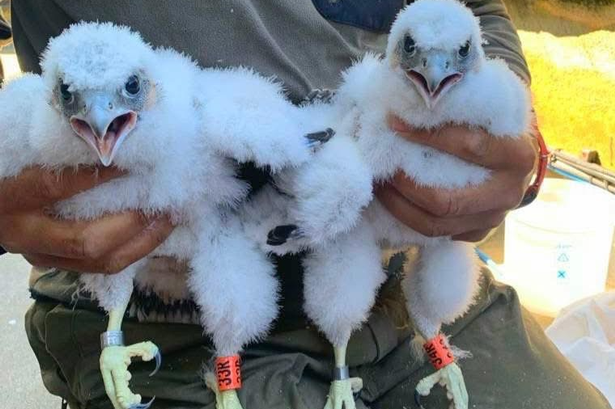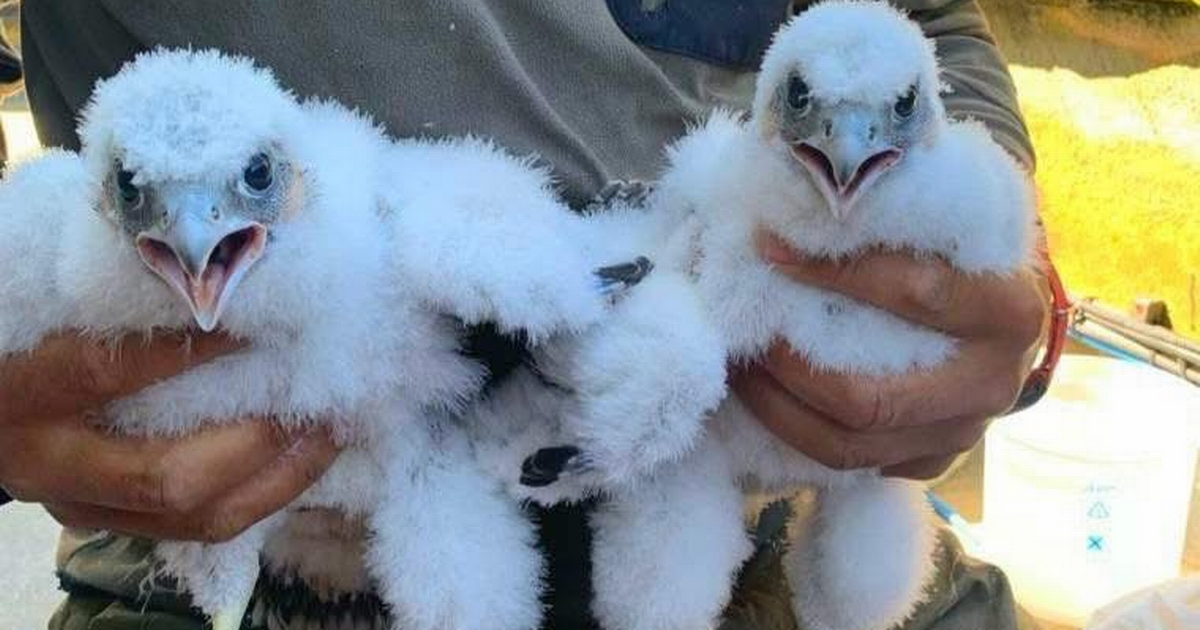The chicks hatched on April 27 in a nest high above University of Glasgow’s iconic Gilbert Scott Building
09:54, 30 May 2025Updated 09:55, 30 May 2025
 Two peregrine falcon chicks born at the University of Glasgow have been named Jack and Victor(Image: University of Glasgow)
Two peregrine falcon chicks born at the University of Glasgow have been named Jack and Victor(Image: University of Glasgow)
Two peregrine falcon chicks born atop the University of Glasgow’s iconic Gilbert Scott Building have been given names that pay tribute to one of Scotland’s best-loved comedy duos, Jack and Victor.
The fluffy newcomers hatched on April 27 in a nest high up in the tower that dominates the skyline above Kelvingrove Park and can be seen from as far as Dumbarton Road in Partick, Glasgow Live reports.
Their proud parents, affectionately named Bonnie and Clyde, return to the Gothic building each spring since 2022 and have become favourites among local birdwatchers.
Content cannot be displayed without consent
On 21 May, members of the Glasgow Peregrine Project scaled the tower to ring the chicks, weigh them, take DNA samples, and install a new nest camera.
During the check-up, they also retrieved an unhatched egg, which they believe was accidentally pierced by a parent’s talon.
Sharing the chosen names on social media, the University of Glasgow wrote: “Say hello to Jack and Victor, the new additions to the UofG Falcon family.
Content cannot be displayed without consent
Bonnie and Clyde, a pair of peregrine falcons who return to nest atop the Gilbert Scott Building each spring, have welcomed their new chicks.
“Last week, the chicks were ringed, weighed, and DNA swabbed, and officially named Jack and Victor in true Glasgow style. The chicks will feature on Landward on BBC Scotland on 12 June.”
Bonnie and Clyde themselves were named in 2024 after the university invited staff and students to suggest names for the breeding pair.
Over 300 suggestions poured in, with ‘Bonnie’ chosen as a nod to ‘Bonnie Scotland’, and ‘Clyde’ referencing the River Clyde.
Peregrine falcons are the fastest animals on Earth, capable of reaching speeds of up to 200 miles per hour as they dive to catch prey. Found across much of the world, they typically grow up to two feet tall with a wingspan approaching four feet.
The Glasgow Peregrine Project has been closely monitoring the birds and has even held public watches in recent years, giving people the chance to witness the remarkable creatures up close.
 Join the Daily Record WhatsApp community!
Join the Daily Record WhatsApp community!
Get the latest news sent straight to your messages by joining our WhatsApp community today.
You’ll receive daily updates on breaking news as well as the top headlines across Scotland.
No one will be able to see who is signed up and no one can send messages except the Daily Record team.
All you have to do is click here if you’re on mobile, select ‘Join Community’ and you’re in!
If you’re on a desktop, simply scan the QR code above with your phone and click ‘Join Community’.
We also treat our community members to special offers, promotions, and adverts from us and our partners. If you don’t like our community, you can check out any time you like.
To leave our community click on the name at the top of your screen and choose ‘exit group’.
If you’re curious, you can read our Privacy Notice.
The RSPB, the University of Glasgow, and the Scottish Ornithologists’ Club are spearheading the project, with support from several other groups.
Clarke Elsby, building surveyor at the University of Glasgow, told the BBC: “We’re keen that Bonnie and Clyde, and now Jack and Victor, are kept in the best possible condition while sharing their stories with our Glasgow community.
“Thanks to this project, we’re not only preserving these remarkable residents, we’re also inspiring a new generation of wildlife enthusiasts across the city.”
John Simpson, Clyde area bird recorder, added: “We’re delighted to be able to contribute to the work of the Glasgow Peregrine Project, and today’s work was vital in following the stories of Bonnie and Clyde.”
